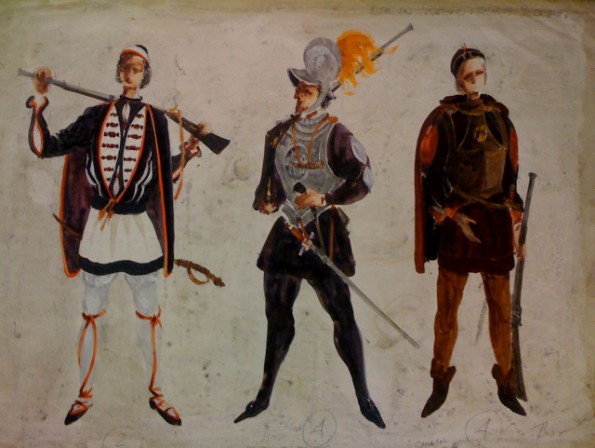Continuing with opera
Tommy made his début at La Scala in Milan in May of 1956 and in 1961 conducted a memorable performance of Luigi Cherubini’s Medea with Maria Callas at La Scala. It was the last opera performance Callas gave there.
Maria Callas with Schippers following the perfomance of Medea at La Scala
In 1963 he made his début at the Bayreuther Festspiele conducting Richard Wagner’s Die Meistersinger von Nürnberg. A short time before the 1965 Festival of Two Worlds in Spoleto began, Tommy married the heiress Nonie Phipps. Following their honeymoon in France, the couple left for Berlin where he conducted the Philharmonic and then went on to Spoleto where he presented Verdi's Otello on June 24. This performance provided the occasion for him to conduct and make his début as stage director. The sets and costumes were designed by Tony Walton, the three-time Tony Award winner who also won an Oscar for All That Jazz.

Design Sketch for Scene 3 of Otello: "The great hall of the castle.” Courtesy of Tony Walton
Costume sketch for Otello. Courtesy of Tony Walton

Otello at the Festival of Two Worlds in Spoleto under Thomas Schippers. Left to right: Peter Glossop (Iago), Tony Walton (sets/costumes),
Thomas Schippers (conductor/ director), Jane Marsh (Desdemona), Tito del Bianco (Otello). Courtesy of Jane Marsh.
September 17, 1966 marked the opening of the new Metropolitan Opera House at Lincoln Center. The idea to base an opera on Shakespeare’s Antony and Cleopatra was suggested originally by Schippers. Samuel Barber composed the opera and Tommy conducted this opening performance.
Perhaps no other opera première had ever been so extensively covered at that time. In fact the press, not the public, on opening night decreed the failure of Antony and Cleopatra. The cast, nevertheless, received fourteen curtain calls at the end of the tragic Third Act. Unfortunately, Franco Zeffirelli’s would-be spectacular staging went awry and, even though the cast and conductor were superb, the performance was generally regarded as a catastrophe.